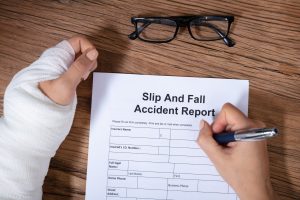 Everyone has an expectation that the property will be safe when they go inside a store, whether it’s a small market or a big-box superstore. That means floors should be free of slip and fall hazards and aisles void of trip and fall hazards, among other things. Unfortunately, that doesn’t always happen. When you’re hurt in a slip-and-fall or trip-and-fall accident on a merchant’s property, there are certain things you must do as part of your Louisiana lawsuit. To make sure you are putting together the right case to get you the successful outcome you seek, be sure to reach out to an experienced New Orleans injury attorney.
Everyone has an expectation that the property will be safe when they go inside a store, whether it’s a small market or a big-box superstore. That means floors should be free of slip and fall hazards and aisles void of trip and fall hazards, among other things. Unfortunately, that doesn’t always happen. When you’re hurt in a slip-and-fall or trip-and-fall accident on a merchant’s property, there are certain things you must do as part of your Louisiana lawsuit. To make sure you are putting together the right case to get you the successful outcome you seek, be sure to reach out to an experienced New Orleans injury attorney.
Whether your slip-and-fall incident is a merchant liability case or one against a private property owner, you must show that the property owner had actual notice of the hazard or else had “constructive notice.” Constructive notice means that the dangerous condition existed for a long enough period of time that the property owner would have known about it if it “exercised reasonable care.”
D.B.’s was a case that focused on that issue of constructive notice and the evidence you need to demonstrate it. D.B. was visiting an Alexandria superstore to get a part for his lawn mower on a very rainy day. As he entered the store, he fell just as he passed through the entry area. In his lawsuit, the customer claimed that he fell in condensation which allegedly surrounded the area.
D.B.’s situation is what is called a “premises liability” case. These cases can include slip-and-fall accidents (like D.B. suffered), trip-and-fall accidents, elevator accidents and an array of other accidents related to proper maintenance of a safe property for people who enter. When you get hurt in a slip-and-fall, trip-and-fall or elevator accident, there are specific things that you have show to the court in order to succeed. If your premises liability case is against a commercial business, then your case has to meet the requirements set by Louisiana’s “merchant liability” statute.
Another piece of your merchant liability case’s “puzzle” is avoiding summary judgment. If the court awards summary judgment to the merchant, then your case gets thrown out before you ever make it to trial. The law says that summary judgment is only to be given if there is no possible factual support for the injured plaintiff’s arguments. In D.B.’s case, the store sought and received an award of summary judgment.
The appeals court concluded that awarding summary judgment to the store in this case was incorrect. The shopper testified that the floor was wet in the entry area and he fell as a result of that wetness. A store employee testified that the floor was not wet before the man entered. As noted above, summary judgment is only a proper outcome if there are no viable disputes of fact. D.B.’s lawsuit was exactly the sort of case that hinged upon a dispute of fact for which each side had legitimate evidence. Disputes like that cannot be resolved by summary judgment and must be allowed to go forward to trial, which is what the appeals court ordered in this situation.
Your slip-and-fall case requires both a detailed awareness of the specific facts of that accident and an in-depth knowledge of the law, especially if you are suing a merchant. Be sure you are equipped for success by putting skilled counsel on your side. The determined Louisiana injury lawyers at the Cardone Law Firm have many years of experience representing the interests of injured people and we know how to get results for you.
For your confidential consultation contact us online or phone Cardone at 504-522-3333.
More Blog Posts:
A Louisiana Court Decides that a Supermarket Shopper Had Enough Evidence to Proceed with Her Slip-and-Fall Case, Louisiana Injury Lawyers Blog, Sept. 10, 2018
Louisiana Court of Appeal Awards Damages to Parents in High School Student’s Sidewalk Slip-and-Fall Case, Louisiana Injury Lawyers Blog, May 22, 2018
 Louisiana Injury Lawyers Blog
Louisiana Injury Lawyers Blog

